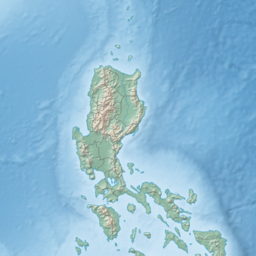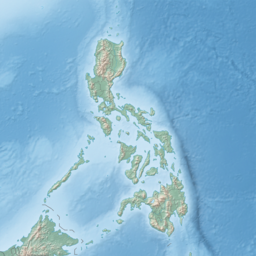Earth:Mount Labo
| Mount Labo | |
|---|---|
| Highest point | |
| Elevation | 1,544 m (5,066 ft) [1][2] |
| Prominence | 1,524 m (5,000 ft) [3] |
| Isolation | 73.5 km (45.7 mi) [4] |
| Listing |
|
| Coordinates | [ ⚑ ] : 14°00′48″N 122°47′15″E / 14.01333°N 122.7875°E [3] |
| Geography | |
| Country | Philippines |
| Region | Bicol Region |
| Province | Camarines Norte |
| Geology | |
| Mountain type |
|
| Volcanic belt | Bicol Volcanic belt |
| Last eruption | Pleistocene[2] |
| Lua error in Module:Mapframe at line 384: attempt to perform arithmetic on local 'lat_d' (a nil value). | |
Mount Labo, is a potentially active stratovolcano in the province of Camarines Norte, in the Bicol Region (Region V), on Luzon Island, in the Philippines . It is located at the northwest end of the Bicol Peninsula.
Physical features
Labo is a forested andesitic stratovolcano, surrounded by numerous andesitic to dacitic satellite lava domes. It has an elevation of 1,544 metres (5,066 ft) asl. Base diameter of this complex volcano is 35 kilometres (22 mi).[1][2] Labo is thermally active with both warm and hot springs.
Economic activities
Mount Labo has been the object of an extensive geothermal exploration program.[2]
Eruptions
Mid-Pleistocene eruptions beginning about 580,000 years ago formed lava domes on the northern side of the complex. The present edifice was formed beginning about 270,000 years ago, and flank lava dome emplacement took place from about 200,000 to about 40,000 years ago.[2]
The latest activity from Mt. Labo produced pyroclastic flows from the summit cone about 27,000 years ago. There have been no eruptions since.[2]
Geology
Rock type is predominantly hornblende-biotite andesite to dacite.[1] Tectonically, Labo is part of the Bicol Volcanic belt.
Listings
The Smithsonian Institution's Global Volcanism Program lists Labo as Pleistocene.[2] Philippine Institute of Volcanology and Seismology (PHIVOLCS) lists Labo as Potentially Active.[1]
See also
- List of active volcanoes in the Philippines
- List of potentially active volcanoes in the Philippines
- List of inactive volcanoes in the Philippines
- List of Ultras of the Philippines
- Philippine Institute of Volcanology and Seismology
- Pacific ring of fire
References
- ↑ 1.0 1.1 1.2 1.3 "Labo". Archived from the original on 1 Sep 2011. https://web.archive.org/web/20110901190207/http://volcano.phivolcs.dost.gov.ph/update_VMEPD/Volcano/VolcanoList/labo.htm. Retrieved 19 March 2019.
- ↑ 2.0 2.1 2.2 2.3 2.4 2.5 2.6 2.7 "Labo". Smithsonian Institution. https://volcano.si.edu/volcano.cfm?vn=273804.
- ↑ 3.0 3.1 "Philippines Mountains"". http://peaklist.org/WWlists/ultras/philippines.html.
- ↑ "Mount Labo, Philippines". http://www.peakbagger.com/peak.aspx?pid=12940.
External links


